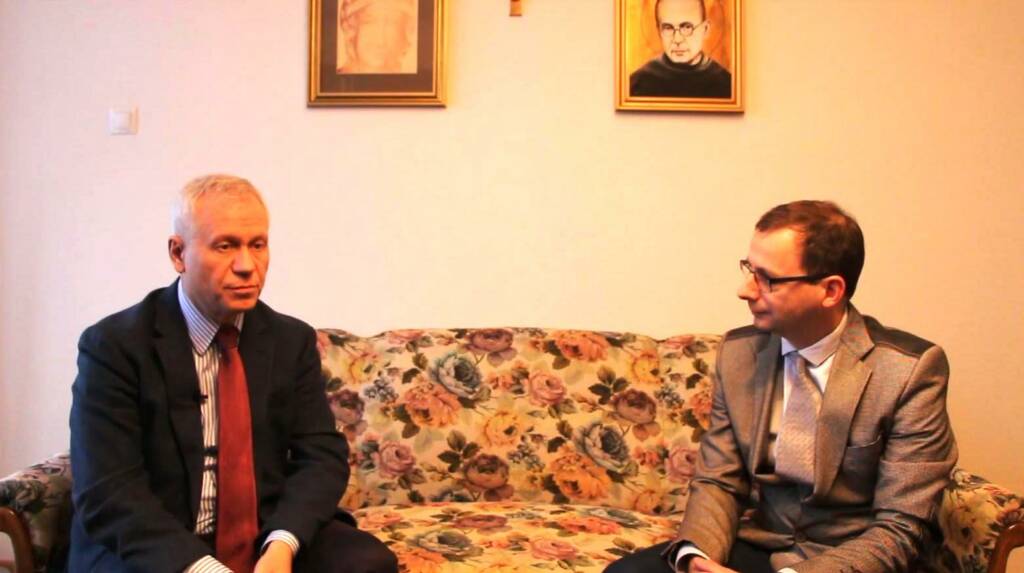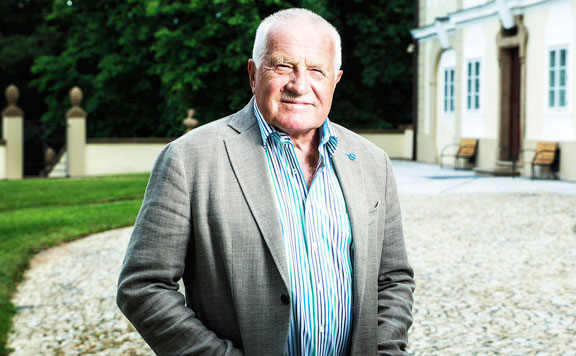Interview with Marek Jurek, former Marshal (President) of the Polish Sejm in 2005–07, former Member of the European Parliament in 2014–19, founding member of the Right of the Republic party (Prawica Rzeczypospolitej), leader of the Christian Social Congress (Chrześcijański Kongres Społeczny).
Together with the Ordo Iuris Institute, the Christian Social Congress is behind the ‘Yes to Family, No to Gender’ citizens’ bill, which aims to have Poland pull out of the Council of Europe Convention on preventing and combating violence against women and domestic violence, known as the “Istanbul Convention”. After collecting 150,000 signatures from citizens, the bill was first debated in the Sejm on Wednesday.
This interview took place on Thursday, March 18.
Olivier Bault: Yesterday, the Sejm was debating the citizens’ bill ‘Yes to Family, No to Gender’ which, if passed, will lead Poland to pull out of the Istanbul Convention. So you don’t want to fight violence, as the Polish left suggests, right?
Marek Jurek: Every civilized country fights against domestic violence and sexual violence, and the only added value of this convention is the gender ideology it carries. Article 12 of the Istanbul Convention claims to eradicate “stereotyped roles” for men and women. There is no more “stereotyped” gender role than in marriage and in the role of father and mother. The Polish constitution protects marriage and motherhood as social values, whereas this convention is based on completely different values. Half of the Central European countries, including all the other Visegrád Group countries, have not ratified this convention. In the Czech Republic there is a liberal government, in Slovakia until recently there was a left-wing government and in Hungary there is a conservative government.
Despite these differences, these three countries, but also others such as Lithuania, Latvia, and especially Bulgaria, reject this convention.
The ‘Yes to Family, No to Gender’ bill has two parts. The second part will oblige the Polish government to propose to its international partners a Convention on the Rights of the Family. The groups represented on our committee that initiated this citizens’ bill had already presented the government with a draft convention. I presented it myself to others on many occasions when I was a Member of the European Parliament, including in the French National Assembly, in Hungary, in Croatia, etc.
Olivier Bault: Will this Convention on the Rights of the Family also contain clauses dealing with domestic violence and violence against women?
Marek Jurek: Yes, because we do not reject all the clauses of the Istanbul Convention. We reject its philosophy. Yesterday, during the debate in the Sejm, I proposed that the vote on the law denouncing the Istanbul Convention should be accompanied by a National Pact against Violence. All the new regulations against domestic violence and violence against the weakest could be incorporated into Polish law through the Act denouncing the Istanbul Convention. That could be the third part of this act. Let us recall that the right, which now has a majority in parliament, has so far done more than the left to combat domestic violence in Poland.
It should also be pointed out that the Istanbul Convention is not only wrong in that it is based on gender ideology, but it is also full of hypocrisy.
In Article 17, for example, the Convention assumes that violent and discriminatory patterns against women must remain present in society. Very harsh treatment is given in Article 12 to traditions and traditional social models which are to be ‘eradicated’. On the other hand, where we are dealing with patterns corresponding to new fashions, such as the promotion of ‘hard-core’ sex in mass culture, with the violence against women that this entails, Article 17 only refers to ‘self-regulation’ of the media, and this “with due respect for freedom of expression”. The second paragraph of this article even states that the best thing to do is to teach parents how their children should avoid being confronted with these patterns, which in any case exist and will continue to exist. This shows that this convention is not against violence, but against the culture based on marriage, family, maternal and paternal responsibility and the institutions on which the life of the nation is based.

Olivier Bault: The European Parliament has already condemned several times the mere fact that Poland is considering pulling out of the Istanbul Convention. Last July, the French Secretary of State for European Affairs, Clément Beaune, said that if Poland denounces the Istanbul Convention, there should be financial sanctions from the EU. Do you not fear European sanctions if Poland pulls out of this convention?
Marek Jurek: In fact, as Poland is a larger country than the six Central European countries that have not ratified this convention, its pulling out of the Istanbul Convention is a necessary condition for building a Union based on respect and cooperation among nations. Under the European treaties, the EU does not have competence for the issues covered by this convention, such as education or the family. The EU’s role should be to build a modus vivendi between countries with different approaches to these issues. This is the mutual respect and unity in diversity that is a declared guiding principle of the EU. Above all, however, the principle of respect for the rule of law precludes any interference by the European institutions in the regulation of these matters at national level.
The leaders of the EU and also the French Secretary of State consider nevertheless that the EU should be the herald of gender ideology. This is a brutal attack on constitutional democracy. In Bulgaria, for example, it was the Constitutional Court that blocked the ratification of the Istanbul Convention, and in Slovakia and Hungary it was also constitutional obstacles that were invoked against ratification. This drive against the constitutional democracy of member states by the same people who claim to defend the rule of law in Poland shows that the attacks on our country have nothing to do with defending democracy. It is only a way of interfering in the political debate within our country.
Olivier Bault: So why, in your opinion, did the United Right coalition now in power not denounce the Istanbul Convention, and why did Prime Minister Mateusz Morawiecki prefer to refer the matter to the Constitutional Court?
Marek Jurek: In 2015, PiS was very vocal against the ratification of this convention, but the first controversies had arisen within Donald Tusk’s government itself after the convention was signed in 2011. Already, the main concern was the idea found in the Istanbul Convention of ‘gender’ replacing sex and the unpredictable consequences this could have in Polish law. Unfortunately, after the 2015 elections, PiS focused on consolidating power at home and neglected defending our principles on the European scene. It is a pity, because Romania and Croatia have since ratified this convention and they might have made a different choice if the example of Poland had emboldened them in their resistance.
Olivier Bault: Do you think your citizens’ bill has a chance of being adopted by the Polish parliament?
Marek Jurek: I hope so. The parliamentary majority has no interest in letting things drag on as they did on the issue of eugenic abortion by refusing to legislate and choosing to turn to the Constitutional Court. In a situation where the European Union is illegally pressuring Central European countries to reject their traditional values, it is important to denounce this Istanbul Convention as soon as possible.
Olivier Bault: How do you explain the extraordinarily aggressive, and even frankly insulting, statements made by some liberal and left-wing MEPs during yesterday’s debate in the Sejm? Or the fact that a mainstream newspaper like Gazeta Wyborcza writes that your citizens’ initiative is “an ultra-Catholic bill” with “fascist-like clauses”? Why such hysteria instead of a normal democratic debate?
Marek Jurek: This shows the real intentions of the Istanbul Convention. That is what I said yesterday in the Sejm: this convention contains within it the elements of an attack on our traditional values, on the ‘stereotyped’ roles of men and women, on the idea of marriage between a man and a woman united by solidarity, love and fidelity. What we saw yesterday in the Sejm is an echo of this convention, which wants to question the foundations of our civilization rather than seeing the source of violence precisely in the violation of the norms of our civilization. It was a festival of hate and contempt for the supporters of our bill, who are regularly dehumanized. For to say that those who oppose gender ideology are supporters of domestic violence is something unimaginable and absolutely shameful. To portray the defenders of the family as supporters of violence is to dehumanize one’s opponents.
Unfortunately, the sources of these insinuations are to be found in the text of the Istanbul Convention itself.
Some of the opposition is seizing on this debate to talk of a further expression of PiS’ supposed authoritarianism. If that were the case, Poland would have pulled out of the Istanbul Convention long ago. It is truly saddening that these self-proclaimed democrats are incapable of imagining that Poles have their own opinions to which they are prepared to devote their efforts and time, the time spent by thousands of volunteers to collect signatures from citizens under the very difficult conditions of the pandemic with the current public health restrictions. The way pro-family NGOs and civil society were treated yesterday is devastating for public debate and for democracy understood as representative government based on free and honest discussion.




